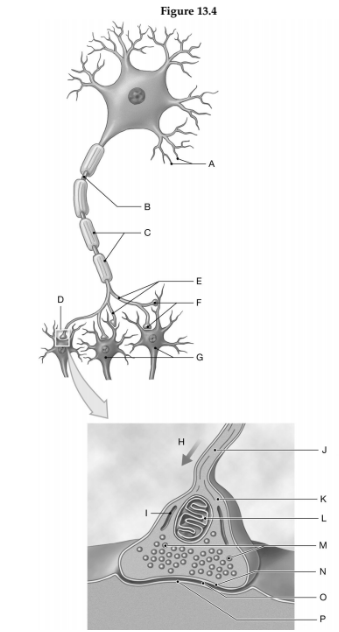Using the figure above, identify the labeled part.

1. Label A: ______________________________
2. Label B: ______________________________
3. Label C: ______________________________
4. Label D: ______________________________
5. Label E: ______________________________
6, Label F: ______________________________
7. Label G: ______________________________
8. Label H: ______________________________
9. Label I: ______________________________
10. Label J: ______________________________
11. Label K: ______________________________
12. Label L: ______________________________
13. Label M: ______________________________
14. Label N: ______________________________
15. Label O: ______________________________
16. Label P: ______________________________
1. Dendrites
2. Axon
3. Myelin
4. Synapse
5. Terminal arborizations
6, Terminal boutons
7. Postsynaptic neurons
8. Impulse conduction
9. Endoplasmic reticulum
10. Terminal arborizations
11. Terminal boutons
12. Mitochondrion
13. Synaptic vesicles
14. Presynaptic membrane
15. Synaptic cleft
16. Postsynaptic membrane
You might also like to view...
Most of the renal sinus is filled by which of the following structures?
A. Renal medulla B. Renal pyramids C. Renal cortex D. Minor calyces E. Renal pelvis
Insulin concentration is measured in a. unit/mm
b. units/mL. c. cm/lb. d. g/mL.
In the development of the skeleton, what typically occurs between the ages of 18 to 21?
A. The epiphysial plates fuse. B. Bone remodeling ceases. C. Red marrow turns to yellow marrow. D. Mineral deposition ceases. E. Appositional growth ceases.
Identify three different types of membranes based on permeability
A) lipid permeable, water permeable, both lipid and water permeable B) protein permeable, lipid permeable, both protein and lipid permeable C) freely permeable, selectively permeable, and impermeable D) cation permeable, anion permeable, both cation and anion permeable E) carbohydrate permeable, protein permeable, drug permeable